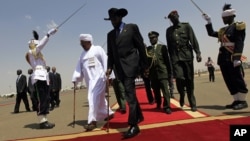NAIROBI - A new report from the Enough Project says South Sudan's leadership is showing more reluctance than before to engage Khartoum to settle outstanding issues, following recent bouts of violence.
Weeks of fighting along the shared but disputed border between Sudan and South Sudan has brought the two countries closest to the brink of war since the South declared independence, nearly a year ago.
The fighting has displaced tens of thousands of people near the border region and, although both sides have agreed in principle to an African Union "road map" to settle the outstanding issues between them, tensions remain high.
But according to Amanda Hsiao, a researcher for Enough Project in Juba and the author of the new report, there is less willingness among the leadership in Juba to engage with Khartoum.
“Increasingly, there is skepticism among the leaders in Juba of the viability of continued talks with Khartoum and the feasibility of improved relations with Khartoum," she said.
Outstanding border issues left unresolved following the south's independence last year and an ongoing dispute about oil revenue are among the obstacles to improving relations between the countries.
An African Union panel has mediated talks to settle the border disputes and to make way for an agreement on oil.
But the Enough Project report says military movement on the ground, including the mobilization of militias backed by the south and continued aerial bombardments by the north, undermined the progress of those talks and moved the two countries closer to war.
Key players in the international community must step in and throw their weight behind the AU's efforts, said Hsiao.
"The coordinated leverage and influence of the U.S. and China, two parties who have considerable leverage over Juba and Khartoum, is absolutely necessary for strengthening the panel's efforts.”
Hsiao added the conflict cannot be resolved by talking about security concerns alone, saying future negotiations must press for agreement on border issues in addition to oil to make any progress toward a lasting peace.




